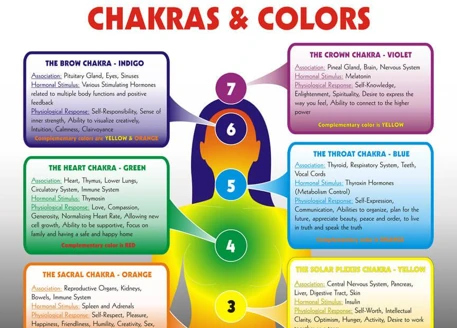The world of chakras is a fascinating and intricate one, filled with vibrant colors and healing energies. Each chakra holds its own significance and plays a crucial role in our overall well-being. In this article, we will delve into the significance of each chakra color in healing, exploring the deep connections between these colors and their corresponding energy centers. By understanding the unique properties of each chakra color and how they can be balanced and healed, we can unlock a deeper sense of self-awareness and spiritual growth. Join us on this captivating journey of discovery as we uncover the mysteries of the chakras and their healing powers.
Contents
- Understanding Chakras
- The Root Chakra – Muladhara
- The Sacral Chakra – Svadhisthana
- The Solar Plexus Chakra – Manipura
- The Heart Chakra – Anahata
- The Throat Chakra – Vishuddha
- The Third Eye Chakra – Ajna
- The Crown Chakra – Sahasrara
- Conclusion
-
Frequently Asked Questions
- What are chakras?
- What do the chakra colors represent?
- How do chakra colors affect our healing?
- What is the significance of the red color in the Root Chakra?
- How can we heal and balance the Root Chakra?
- What does the orange color represent in the Sacral Chakra?
- What techniques can we use to heal and balance the Sacral Chakra?
- What does the yellow color symbolize in the Solar Plexus Chakra?
- How can we heal and balance the Solar Plexus Chakra?
- What does the green color represent in the Heart Chakra?
- What practices can help heal and balance the Heart Chakra?
- References
Understanding Chakras
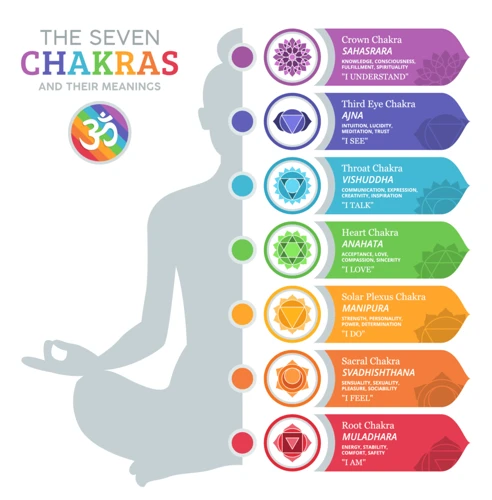
Chakras are the energy centers located along the spine, each associated with different colors and aspects of our physical, emotional, and spiritual well-being. These swirling vortices of energy, when balanced and aligned, contribute to our overall vitality and harmony. Understanding chakras allows us to tap into this profound source of healing and self-awareness. From the vibrant red of the Root Chakra, symbolizing grounding and stability, to the serene violet of the Crown Chakra, representing spiritual connection and transcendence, each chakra color holds its own significance and purpose. By exploring the significance of each chakra color, we can gain a deeper understanding of ourselves and embark on a transformative journey towards balance and self-realization. To learn more about healing chakra colors and their impact on our mind, body, and spirit, continue reading.
The Seven Major Chakras
The Seven Major Chakras are the core energy centers of our being, each representing a specific aspect of our physical, emotional, and spiritual existence. They are interconnected and aligned along the spine, from the base to the crown. Here is a breakdown of the Seven Major Chakras:
1. Root Chakra (Muladhara): Located at the base of the spine, it is associated with the color red. This chakra represents our foundation, stability, and grounding. It connects us to the physical world and helps us feel secure.
2. Sacral Chakra (Svadhisthana): Situated just below the navel, it is associated with the color orange. This chakra governs our creativity, sexuality, and passion. It is the center of our emotions and pleasure.
3. Solar Plexus Chakra (Manipura): Found in the upper abdomen, it is associated with the color yellow. This chakra is linked to our self-esteem, personal power, and confidence. It plays a vital role in shaping our identity and sense of purpose.
4. Heart Chakra (Anahata): Located in the center of the chest, it is associated with the color green. This chakra represents love, compassion, and harmony. It enables us to give and receive love, fostering emotional healing and connection.
5. Throat Chakra (Vishuddha): Situated in the throat region, it is associated with the color blue. This chakra governs communication, self-expression, and authenticity. It empowers us to speak our truth and find our voice.
6. Third Eye Chakra (Ajna): Found between the eyebrows, it is associated with the color indigo. This chakra symbolizes intuition, inner wisdom, and spiritual insight. It opens up our perception and allows us to access higher realms of consciousness.
7. Crown Chakra (Sahasrara): Located at the top of the head, it is associated with the colors violet or white. This chakra connects us to the divine, spiritual realms, and higher consciousness. It represents our spiritual awakening and enlightenment.
Understanding the significance of each chakra and its corresponding color is crucial in balancing mind, body, and spirit. By harmonizing these energy centers, we can experience a deeper sense of well-being, emotional stability, and spiritual transformation.
The Root Chakra – Muladhara
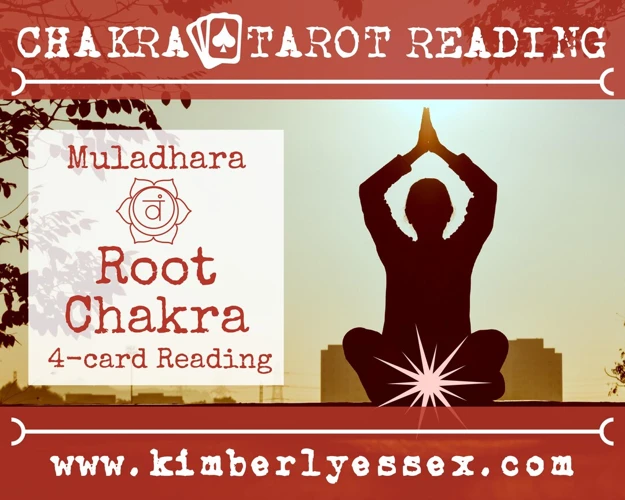
The Root Chakra, also known as Muladhara, is the foundation of the chakra system and is associated with the color red. This chakra is located at the base of the spine and represents our connection to the physical world, stability, and survival instincts. It is crucial to balance and heal the Root Chakra in order to establish a solid foundation for personal growth and transformation. The red color of this chakra signifies strength, vitality, and grounding. When the Root Chakra is imbalanced, it can manifest as feelings of insecurity, fear, and instability. By understanding the significance of the red color in relation to the Root Chakra, we can embark on a journey of self-discovery and personal transformation. Through various healing practices such as meditation, yoga, and energy work, we can restore balance to the Root Chakra and cultivate a sense of security, stability, and physical well-being.
Significance of the Red Color
The red color holds immense significance when it comes to the Root Chakra, also known as Muladhara. As the first chakra located at the base of the spine, it represents our foundation, stability, and sense of belonging. Red is associated with vitality, strength, and passion, making it a powerful color for grounding and energizing. This vibrant hue stimulates the Root Chakra, activating the flow of energy and promoting a sense of safety and security. It is believed that an imbalance in the Root Chakra can lead to feelings of fear, insecurity, and instability. By incorporating the color red into our lives, whether through clothing, decor, or visualization, we can help heal and balance our Root Chakra. Some practices to enhance the Root Chakra include meditation, affirmations, and physical activities like yoga or walking. Embracing red-colored foods, such as beets or strawberries, can also be beneficial. By understanding the significance of the red color in relation to the Root Chakra, we can harness its power and restore grounding and stability in our lives.
Healing and Balancing the Root Chakra
When it comes to healing and balancing the Root Chakra, there are several effective techniques and practices that can be utilized. These methods focus on restoring a sense of stability, security, and groundedness within oneself. Here are some approaches to healing and balancing the Root Chakra:
- Color Therapy: Incorporating the color red into your surroundings or wearing red clothing can stimulate and harmonize the Root Chakra. This color is associated with energy, courage, and vitality.
- Meditation: Practicing grounding and visualization meditations can help bring attention and awareness to the Root Chakra. Imagining yourself rooted to the Earth, like a strong tree or sturdy mountain, can promote a sense of stability and security.
- Physical Exercise: Engaging in physical activities that focus on the lower body, such as walking, jogging, or practicing yoga poses like the Tree Pose or Warrior Pose, can help activate and balance the Root Chakra.
- Aromatherapy: Using essential oils like cedarwood, patchouli, or vetiver can have a grounding effect on the Root Chakra. Diffusing these scents or using them during a bath or massage can promote a sense of stability and security.
- Crystal Healing: Crystals like garnet, red jasper, and hematite are associated with the Root Chakra. Placing these crystals on or near the chakra, using them during meditation, or wearing them as jewelry can assist in restoring balance and energy flow.
- Connection with Nature: Spending time in nature can greatly support Root Chakra healing. Walking barefoot on the earth, gardening, or simply sitting under a tree can help cultivate a sense of grounding and connection.
By incorporating these practices into your daily routine, you can effectively promote healing and balancing of the Root Chakra. Remember, the key is to create a nurturing and supportive environment that encourages stability and security within yourself.
The Sacral Chakra – Svadhisthana
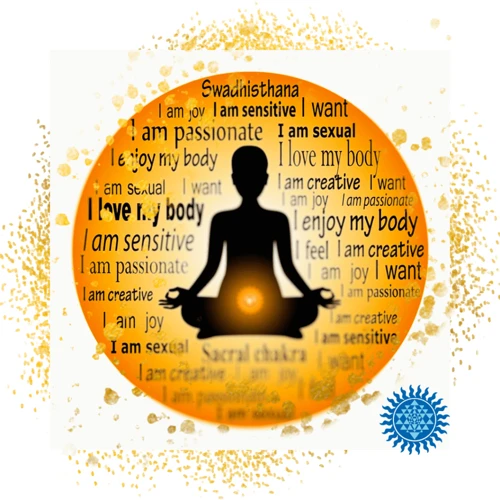
The Sacral Chakra, also known as Svadhisthana, is the second of the seven major chakras. It is represented by the color orange and is located just below the belly button. This chakra is associated with our emotions, creativity, and sexual energy, making it a vital center for personal expression and pleasure. The significance of the orange color in the Sacral Chakra relates to its vibrant and warm nature, symbolizing passion, enthusiasm, and vitality. When the Sacral Chakra is in balance, it allows for a healthy flow of emotions, creativity, and sensuality. To heal and balance the Sacral Chakra, one can engage in activities such as art, dance, and intimate connections, as well as incorporating orange-colored foods and crystals into their daily life. By nourishing and harmonizing the Sacral Chakra, we can cultivate a deep sense of joy, passion, and emotional well-being in our lives.
Significance of the Orange Color
The orange color holds great significance when it comes to the Sacral Chakra, also known as Svadhisthana. This chakra is located in the lower abdomen and is associated with creativity, passion, sexuality, and emotional balance. Orange, as the color of this chakra, represents warmth, enthusiasm, and vitality. It is a vibrant and energetic color that stimulates creativity and ignites our passion for life. Just like the orange hues of a sunset, this color evokes feelings of joy, abundance, and sensuality.
When the Sacral Chakra is in balance and the orange color is vibrant, we feel a sense of emotional stability, creative inspiration, and a deep connection with our own sensuality and desires. It encourages us to embrace pleasure and seek healthy relationships. On the other hand, an imbalance in this chakra or a dullness in the orange color may manifest as a lack of creativity, emotional instability, and a disconnection from our own desires and passions.
To heal and balance the Sacral Chakra and restore the significance of the orange color, there are various practices we can engage in. We can incorporate activities such as dance, painting, or writing to stimulate our creative energy. Spending time in nature, particularly around flowing water, can also be beneficial. Additionally, practicing mindfulness and exploring our emotions in a safe and non-judgmental way can help us connect with our emotional center. Using orange crystals such as carnelian or citrine, or incorporating orange foods like oranges, carrots, and sweet potatoes into our diet can further support the healing process.
By understanding the significance of the orange color within the context of the Sacral Chakra, we can harness its energy to unlock our creative potential, embrace our passions, and cultivate a balanced and fulfilling emotional life.
Healing and Balancing the Sacral Chakra
Healing and balancing the Sacral Chakra, also known as Svadhisthana, is crucial for fostering creativity, passion, and healthy relationships. The Sacral Chakra is represented by the color orange, which symbolizes warmth, vitality, and emotional well-being. When this chakra is out of balance, it can manifest as a lack of inspiration, low self-esteem, or difficulties in establishing intimate connections with others. To heal and balance the Sacral Chakra, there are several practices one can engage in. Meditation, specifically focusing on the orange color and visualizing it flowing through the chakra, can help restore balance. Additionally, practicing yoga poses that target the hips and pelvic area, such as the Butterfly Pose or the Pigeon Pose, can release stagnant energy and promote a healthy flow of creativity. Another effective technique is using essential oils with warm, citrusy scents, such as orange or bergamot, to stimulate the senses and activate the Sacral Chakra. By incorporating these healing practices into our daily lives, we can unlock our creative potential, ignite our passions, and cultivate harmonious relationships in alignment with the vibrant energy of the Sacral Chakra.
The Solar Plexus Chakra – Manipura
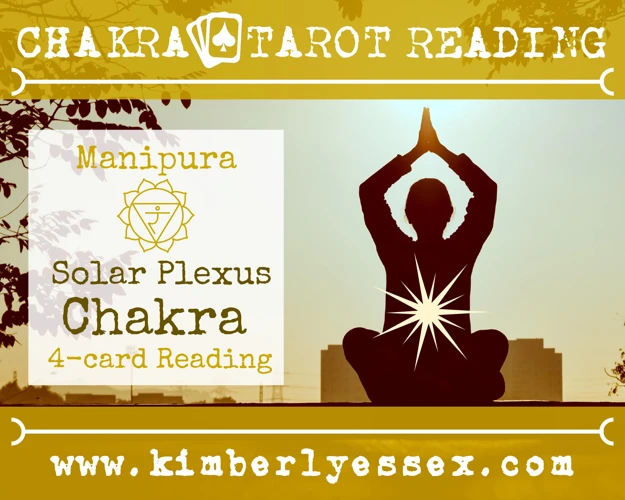
The Solar Plexus Chakra, known as Manipura, is the third chakra in the chakra system. Located above the navel, it is associated with the color yellow. This chakra governs our personal power, confidence, self-esteem, and willpower. When the Solar Plexus Chakra is in balance, we feel empowered, motivated, and assertive. However, if it becomes blocked or imbalanced, we may struggle with insecurity, low self-esteem, and a lack of direction. To heal and balance the Solar Plexus Chakra, there are various techniques you can incorporate into your daily routine. These include practicing breathing exercises, engaging in physical activities that promote self-confidence, and setting clear intentions and goals for yourself. By embracing the essence of the yellow color and nourishing the Solar Plexus Chakra, you can unlock your true potential and step into a life filled with inner strength and purpose.
Significance of the Yellow Color
The color yellow holds a significant role in the Solar Plexus Chakra, also known as Manipura. It is associated with personal power, confidence, and self-esteem. Yellow represents the vibrant energy of the sun and symbolizes warmth, optimism, and joy. Just as the sun radiates light and illuminates the world, the yellow color represents the inner fire and strength within us. When the Solar Plexus Chakra is balanced and harmonized, it allows us to assert ourselves, take action, and pursue our goals with confidence. It empowers us to trust our intuition and make decisions that align with our true selves. When this chakra is imbalanced, we may experience a lack of self-confidence, feel indecisive, or struggle with self-doubt. To balance and heal the Solar Plexus Chakra, incorporating yellow in our surroundings and daily life can be beneficial. Surrounding ourselves with yellow flowers, wearing yellow clothing, or visualizing a vibrant yellow light at the solar plexus area during meditation can aid in restoring the balance of this chakra. Additionally, incorporating yellow foods like bananas, lemons, or pineapple into our diet can help provide a boost of energy and support the Solar Plexus Chakra. Remember, embracing the significance of the yellow color can promote confidence, personal power, and a strong sense of self.
Healing and Balancing the Solar Plexus Chakra
When it comes to healing and balancing the Solar Plexus Chakra, there are several techniques and practices that can be beneficial. First and foremost, it is important to understand that the Solar Plexus Chakra is associated with the color yellow and is located in the upper abdomen area. This chakra is responsible for our personal power, self-confidence, and willpower.
One approach to healing and balancing the Solar Plexus Chakra is through the use of therapeutic crystals. Citrine and golden yellow calcite are two powerful crystals that resonate with the energy of the Solar Plexus Chakra. Placing these crystals on the chakra area during meditation or wearing them as jewelry can help to enhance and activate the energy flow.
Another effective method is through the practice of certain yoga poses. Poses that involve twists, such as the Supine Twist or the Revolved Triangle Pose, can aid in stimulating and opening the Solar Plexus Chakra. Additionally, practicing pranayama breathing exercises, such as the Breath of Fire, can help to activate and cleanse the energy of this chakra.
Incorporating yellow foods into your diet can also support the healing and balancing of the Solar Plexus Chakra. Foods such as yellow bell peppers, bananas, corn, and turmeric are known to resonate with the energy of this chakra. Consuming these foods mindfully and with gratitude can create a harmonizing effect on the chakra.
Lastly, it is important to cultivate self-confidence and self-worth in order to balance the Solar Plexus Chakra. Engaging in activities that boost your self-esteem, setting healthy boundaries, and practicing self-care are all vital components of chakra healing. Affirmations such as “I am confident and worthy of all that I desire” can be repeated regularly to reinforce positive beliefs and restore balance to the Solar Plexus Chakra.
By incorporating these practices into your daily routine, you can promote the healing and balancing of the Solar Plexus Chakra, allowing for a greater sense of personal power, confidence, and self-expression. Remember to listen to your body and intuition as you explore these techniques, and always approach chakra healing with an open mind and heart.
The Heart Chakra – Anahata
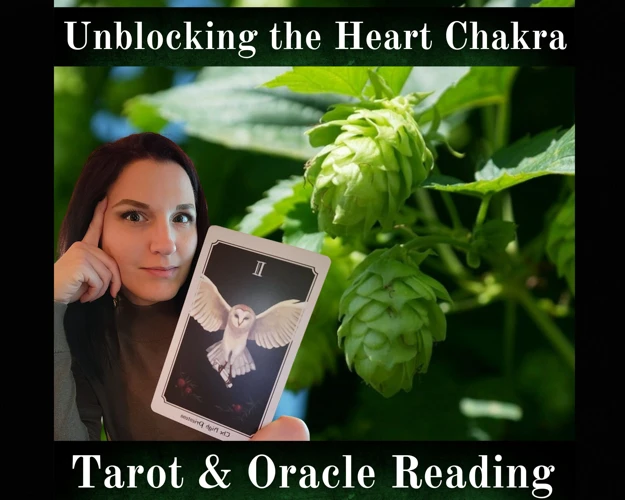
The Heart Chakra, known as Anahata in Sanskrit, is the fourth chakra in the chakra system. It is located in the center of the chest and is associated with the color green. The Heart Chakra represents love, compassion, and emotional balance. When the Heart Chakra is in balance, we experience feelings of empathy, forgiveness, and unity. The green color of this chakra symbolizes growth, harmony, and healing. It is connected to our ability to give and receive love, both for ourselves and others. When the Heart Chakra is imbalanced, we may experience issues such as feelings of isolation, resentment, or an inability to trust. To heal and balance the Heart Chakra, various practices can be employed, such as practicing self-love and acceptance, engaging in acts of kindness, and opening ourselves to deeper connections and emotional vulnerability. By nurturing our Heart Chakra, we can cultivate a greater sense of love, compassion, and harmony in our lives.
Significance of the Green Color
The green color holds great significance when it comes to the Heart Chakra, also known as Anahata. As the central chakra in the system, the Heart Chakra represents love, compassion, and harmony. The color green is closely associated with nature and symbolizes growth, renewal, and balance. Just as lush greenery nourishes and sustains life, the green energy of the Heart Chakra nourishes our emotional well-being, fostering love and empathy towards ourselves and others. It serves as a bridge between the lower and upper chakras, integrating our earthly desires with our spiritual aspirations. When the Heart Chakra is open and balanced, we experience deep connections, unconditional love, and emotional healing. It allows us to forgive, let go of past grievances, and cultivate harmonious relationships. The green color also stimulates the growth and healing of our physical body. It is believed to have a calming and soothing effect on our nervous system, promoting relaxation and reducing stress. To enhance the healing and balancing of the Heart Chakra, surround yourself with green surroundings, spend time in nature, and engage in activities that promote love and compassion towards yourself and others. Embracing the green energy of the Heart Chakra can facilitate personal transformation and growth as we open ourselves to the power of love and connection.
Healing and Balancing the Heart Chakra
Healing and balancing the Heart Chakra, also known as Anahata, is essential for nurturing love, compassion, and emotional well-being. When the Heart Chakra is imbalanced, we may experience feelings of loneliness, bitterness, or an inability to give and receive love. To restore harmony to the Heart Chakra, there are several powerful healing techniques that can be utilized:
1. Meditation: Regular meditation focusing on the heart center can help open and heal the Heart Chakra. Visualize a glowing emerald-green light radiating from your chest, enveloping your entire being in love and compassion.
2. Heart-Opening Yoga Poses: Certain yoga poses, such as Camel Pose (Ustrasana) and Fish Pose (Matsyasana), can help release tension and open the chest, stimulating energy flow to the Heart Chakra.
3. Crystal Therapy: Crystals such as rose quartz and green aventurine resonate with the energy of the Heart Chakra. Placing these crystals on the heart or wearing them as jewelry can promote healing and balance.
4. Aromatherapy: Essential oils like rose, jasmine, and bergamot have soothing and uplifting properties that can aid in Heart Chakra healing. Diffuse these oils or apply a few drops to the heart center during meditation.
5. Journaling and Self-Reflection: Take the time to reflect on past emotional wounds and practice forgiveness and self-compassion. Write down your feelings and intentions in a journal, allowing yourself to release any emotional blockages.
Remember to approach the healing process with patience and self-care. It may take time to fully restore balance to the Heart Chakra, but with consistent practice and intention, you can cultivate a deep sense of love and compassion within yourself and towards others.
The Throat Chakra – Vishuddha
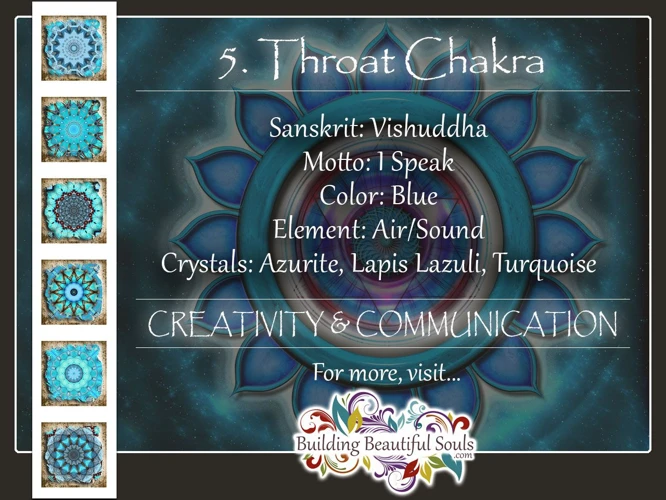
Located at the base of our throat, the Throat Chakra, also known as Vishuddha, is associated with the color blue. This energy center is connected to our communication, self-expression, and ability to speak our truth. When the Throat Chakra is balanced and flowing harmoniously, we can effectively express ourselves, communicate our needs, and listen attentively. The blue color of this chakra represents calmness, clarity, and serenity. It invites us to find our voice and communicate with authenticity. To heal and balance the Throat Chakra, there are various practices we can incorporate into our daily lives. These include gentle neck stretches, practicing active listening, engaging in creative expression such as writing or singing, and surrounding ourselves with soothing shades of blue. By nurturing our Throat Chakra, we not only improve our ability to communicate effectively but also enhance our overall sense of self-expression and connection to others.
Significance of the Blue Color
The Throat Chakra, also known as Vishuddha, is associated with the color blue. This serene and tranquil color holds great significance in relation to the chakra’s energy and healing properties. Blue represents communication, self-expression, and the power of the spoken word. The Throat Chakra acts as a bridge between our inner truth and the outer world, enabling us to confidently express ourselves and communicate our thoughts, feelings, and ideas. When this chakra is balanced and flowing harmoniously, we experience clear communication, effective self-expression, and a strong ability to articulate our needs and desires.
The blue color of the Throat Chakra is reminiscent of the calmness of a clear sky or a tranquil ocean. It promotes a sense of tranquility, peace, and serenity, which aids in effective communication. The throat area is the physical manifestation of this chakra, and by visualizing a shimmering blue light during meditation or energy healing, we can enhance the chakra’s healing energies and restore balance.
When the Throat Chakra is out of balance, it can manifest as difficulty in expressing oneself, fear of speaking up, or even physical ailments such as throat infections and thyroid disorders. In such cases, healing and balancing the Throat Chakra becomes essential. This can be achieved through various practices such as chanting, singing, journaling, or engaging in activities that encourage self-expression. Surrounding yourself with the color blue, wearing blue gemstones like aquamarine or lapis lazuli, or using essential oils with a blue hue such as chamomile or blue tansy can also support the healing process.
By acknowledging the significance of the blue color in relation to the Throat Chakra, we can unlock the power of clear communication and self-expression. Embracing this healing color and engaging in practices that promote balance in the Throat Chakra can lead to a greater sense of authenticity, assertiveness, and effective communication in our daily lives.
Healing and Balancing the Throat Chakra
When it comes to healing and balancing the Throat Chakra, there are several practices and techniques that can be beneficial. The Throat Chakra, also known as Vishuddha, is associated with the color blue and is located at the throat region. It governs communication, self-expression, and the ability to speak one’s truth. To heal and balance this chakra, consider the following:
1. Sound Therapy: Since the Throat Chakra is associated with the power of sound, using sound therapy can be highly effective. Chanting mantras like “HAM” or listening to soothing music can help clear any energetic blockages in the throat area and promote the flow of self-expression.
2. Journaling: Writing down your thoughts, feelings, and emotions can be a powerful way to explore and express your truth. Set aside some time each day to journal and allow your authentic voice to emerge.
3. Creative Expression: Engaging in creative activities such as painting, singing, or dancing can help unlock and activate the energy of the Throat Chakra. Explore different forms of self-expression and find what resonates with you.
4. Gemstone Therapy: Gemstones like blue lace agate or lapis lazuli can aid in the healing and balancing of the Throat Chakra. Carry these stones with you or wear them as jewelry to enhance their energetic properties.
5. Practice Mindful Listening: Cultivating the skill of active listening can support the healing of the Throat Chakra. Practice being fully present when others are speaking, without interrupting or judgment, creating a safe space for open and authentic communication.
Remember, healing and balancing the Throat Chakra is an ongoing process. Be patient and kind to yourself as you explore techniques that resonate with you. By nurturing and harmonizing the energy of the Throat Chakra, you can enhance your ability to express your truth with clarity and authenticity.
The Third Eye Chakra – Ajna
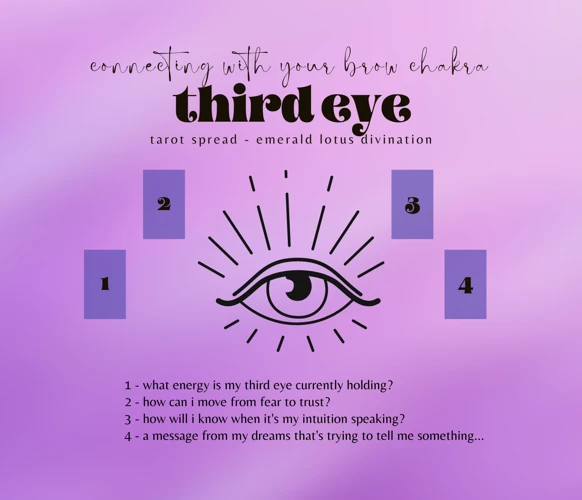
The Third Eye Chakra, also known as Ajna, is the sixth chakra located in the middle of the forehead, between the eyebrows. It is associated with the color indigo, which represents intuition, wisdom, and inner guidance. The Third Eye Chakra acts as a gateway to higher consciousness and spiritual awareness. When this chakra is balanced and open, it allows us to access our inner wisdom and connect with our higher self. Imbalances in the Third Eye Chakra can manifest as issues with intuition, clarity of thought, and decision-making. To heal and balance the Third Eye Chakra, various practices can be incorporated, such as meditation, visualization, and using indigo-colored gemstones like amethyst or lapis lazuli. By nurturing and aligning the Third Eye Chakra, we can develop a deeper sense of insight and clarity, and enhance our spiritual growth and intuitive abilities.
Significance of the Indigo Color
Indigo, the color associated with the Third Eye Chakra, holds immense significance in the realm of chakra healing. This deep and mysterious shade of blue represents intuition, wisdom, and spiritual awareness. Just as the night sky reveals hidden galaxies and celestial wonders, the indigo color invites us to explore the depths of our inner consciousness. It is the color of introspection and the doorway to higher states of perception. Indigo stimulates our intuitive abilities, enabling us to tap into our inner knowing and trust our gut instincts. This color encourages self-reflection, introspection, and the cultivation of inner wisdom. It invites us to quiet the noise of the external world and journey within, where profound insights and spiritual truths reside. When the Third Eye Chakra is balanced and aligned, the indigo color brings clarity of thought and inspiration, expanding our consciousness and opening the doors to higher realms of reality. Embracing the significance of indigo allows us to embrace our inner guidance and embark on a transformative journey of spiritual growth and self-discovery.
Healing and Balancing the Third Eye Chakra
Healing and balancing the Third Eye Chakra, also known as the Ajna Chakra, is essential for enhancing our intuition, imagination, and inner wisdom. Located in the center of the forehead, this chakra is associated with the color indigo. To heal and balance the Third Eye Chakra, there are several practices that can aid in its activation.
Meditation is a powerful tool for connecting with the Third Eye Chakra. By quieting the mind and focusing on the space between the eyebrows, we can activate this energy center and awaken our intuition. Visualizations of indigo light or the symbol of the Third Eye Chakra can enhance the healing process.
Another technique for healing and balancing the Third Eye Chakra is through the use of affirmations. Repeat positive statements such as “I trust my intuition” or “I am connected to my inner wisdom” to reinforce the energy flow in this chakra.
Crystals can also play a significant role in harmonizing the Third Eye Chakra. Amethyst, lapis lazuli, and labradorite are popular choices due to their indigo coloring and spiritual properties. Placing these crystals on the forehead or using them during meditation can help activate and balance the energy of the Third Eye Chakra.
Aromatherapy can also support the healing process of the Third Eye Chakra. Essential oils such as frankincense, patchouli, and sandalwood have been traditionally used to stimulate intuition and enhance spiritual awareness. Diffusing these oils or using them during meditation can create a supportive and healing environment.
By incorporating these practices into our daily lives, we can heal and balance the Third Eye Chakra, allowing us to tap into our inner guidance and gain clarity in our spiritual journey. Remember to listen to your intuition and honor the wisdom that lies within, as the Third Eye Chakra holds the key to expanded consciousness and higher realms of understanding.
The Crown Chakra – Sahasrara
The Crown Chakra, also known as Sahasrara, is the seventh and highest chakra in the chakra system. It is represented by the color violet or white, and it is located at the top of the head. The Crown Chakra is associated with spiritual connection, enlightenment, and higher consciousness. This chakra serves as the gateway to divine energy and universal wisdom. When the Crown Chakra is balanced and open, it allows for an effortless flow of spiritual energy, leading to a profound sense of unity and oneness with the universe. Healing and balancing the Crown Chakra can be achieved through various practices such as meditation, mindfulness, and connecting with nature. By attuning to the energy of the Crown Chakra, we open ourselves up to divine knowledge and guidance, fostering a deep sense of spiritual fulfillment and inner peace.
Significance of the Violet/White Color
The Violet/White color holds immense significance when it comes to the Crown Chakra. As the highest chakra in the system, the Crown Chakra represents our connection to the divine and our spiritual consciousness. The combination of violet and white symbolizes purity, enlightenment, and transcendence.
Violet, a color associated with spirituality and intuition, represents spiritual transformation and deep consciousness. It encourages us to tap into our higher selves, embrace our inner wisdom, and connect with the universal energy around us. Violet helps us open our minds to the realm of spirituality and expand our spiritual awareness.
White, on the other hand, is a color of purity and clarity. It represents the state of ultimate transcendence, where the self merges with the divine. White color embodies divine light, purity of thoughts, and liberation from the constraints of the material world. It signifies the awakening of higher consciousness and the experience of unity with all that is.
When the Crown Chakra is balanced and in harmony, the Violet/White color radiates and illuminates our spiritual path. We feel a deep sense of connection to something greater than ourselves and experience moments of profound spiritual awakening. We have a heightened sense of purpose, clarity of mind, and a profound understanding of our place in the universe.
To balance and heal the Crown Chakra and embrace the significance of the Violet/White color, one can practice meditation, engage in spiritual practices, and cultivate a connection with the higher realms. By focusing on stillness, silence, and embracing the power of the present moment, we can experience the transformative energy of the Crown Chakra, allowing it to guide us on our spiritual journey of self-discovery and enlightenment.
Healing and Balancing the Crown Chakra
The Crown Chakra, also known as Sahasrara, is the pinnacle of the chakra system and represents our connection to the divine and higher consciousness. Located at the top of the head, its color is often associated with violet or white. Healing and balancing the Crown Chakra is crucial for achieving spiritual enlightenment and transcending the limitations of the physical realm.
To heal and balance the Crown Chakra, various practices can be incorporated into our daily lives. Meditation is a powerful tool, allowing us to quiet the mind and connect with our higher selves. During meditation, focus on visualizing a violet or white light radiating from the crown of the head, cleansing and energizing the chakra. Affirmations and positive intentions can also be used to enhance the healing process. Repeat statements such as “I am connected to divine wisdom” or “I trust in the universal flow of life” to strengthen the Crown Chakra’s energy.
Crystals like amethyst, clear quartz, and selenite are known to assist in Crown Chakra healing. Placing these stones on the crown of the head or using them during meditation can amplify the chakra’s energy and promote balance.
Engaging in activities that foster a sense of spirituality can further support the healing of the Crown Chakra. This can include practices such as yoga, prayer, or connecting with nature. By nurturing our spiritual side, we create space for the crown chakra to open and expand.
Healing and balancing the Crown Chakra allows us to tap into our highest self and experience a deep sense of connection to the divine. By incorporating practices such as meditation, affirmations, crystals, and spiritual activities into our lives, we can harmonize the energy of the Crown Chakra and access higher levels of awareness and consciousness. Embrace the journey of unlocking the full potential of the Crown Chakra and allow it to guide you towards a state of spiritual transcendence and enlightenment.
Conclusion
In conclusion, exploring the significance of each chakra color in healing is a profound journey that allows us to tap into the remarkable power of our energy centers. Through understanding and working with the unique properties of each chakra color, we can promote balance, healing, and self-growth in our lives. From the vibrant red of the Root Chakra, representing grounding and stability, to the serene violet of the Crown Chakra, symbolizing spiritual connection and transcendence, each color holds its own significance and resonates with different aspects of our being. By harmonizing and balancing these colors within ourselves, we create a harmonious flow of energy that positively impacts our physical, emotional, and spiritual well-being. It is essential to remember that chakra healing and color therapies are complementary practices that support overall wellness. Exploring the significance of chakra colors is just the beginning of a transformative journey towards self-discovery, awareness, and personal transformation. Embrace the beauty and power of each color, and allow them to guide you on a remarkable path of healing, growth, and self-realization.
Frequently Asked Questions
What are chakras?
Chakras are the energy centers in our body that are connected to different aspects of our physical, emotional, and spiritual well-being. There are seven major chakras that align along the spine.
What do the chakra colors represent?
The chakra colors represent different energies and qualities associated with each energy center. Each color holds its own significance and is linked to specific emotions and characteristics.
How do chakra colors affect our healing?
Chakra colors have a profound impact on our healing process. When the colors of our chakras are balanced and vibrant, it indicates a state of overall well-being. Imbalances or blockages in chakra colors can manifest as physical, emotional, or spiritual issues.
What is the significance of the red color in the Root Chakra?
The red color in the Root Chakra signifies grounding, stability, and a sense of safety. It is associated with our primal instincts, survival, and our connection to the physical world.
How can we heal and balance the Root Chakra?
Healing and balancing the Root Chakra involves practices such as grounding exercises, connecting with nature, using red gemstones or crystals, and engaging in activities that promote a sense of security and stability.
What does the orange color represent in the Sacral Chakra?
The orange color in the Sacral Chakra represents creativity, passion, and emotional well-being. It is associated with our ability to experience pleasure, indulge in healthy relationships, and embrace our sensual nature.
What techniques can we use to heal and balance the Sacral Chakra?
Healing and balancing the Sacral Chakra can be achieved through practices like creative expression, engaging in pleasurable activities, practicing emotional release, and using orange crystals or essential oils.
What does the yellow color symbolize in the Solar Plexus Chakra?
The yellow color in the Solar Plexus Chakra symbolizes personal power, confidence, and self-esteem. It is associated with our ability to assert ourselves, make decisions, and take action.
How can we heal and balance the Solar Plexus Chakra?
To heal and balance the Solar Plexus Chakra, one can engage in activities that boost self-confidence, practice mindfulness and self-reflection, incorporate yellow gemstones or essential oils, and foster a sense of personal empowerment.
What does the green color represent in the Heart Chakra?
The green color in the Heart Chakra represents love, compassion, and emotional healing. It is associated with our ability to give and receive love, cultivate forgiveness, and foster harmonious relationships.
What practices can help heal and balance the Heart Chakra?
Healing and balancing the Heart Chakra can be supported through practices like practicing self-love and self-care, engaging in acts of kindness and compassion, surrounding oneself with nature, and using green gemstones or essential oils.

